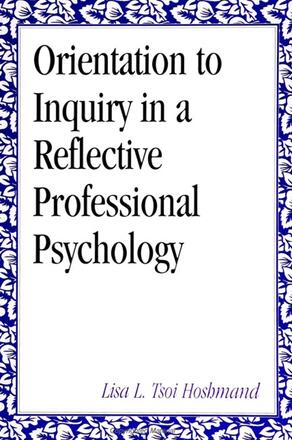
Orientation to Inquiry in a Reflective Professional Psychology
Alternative formats available from:
Description
This book approaches professional inquiry in psychology from a perspective that integrates research and practice and prepares students for the diversity of methods employed in the field. It examines a broad range of models and methods of inquiry in both research and practice and provides a framework for linking issues of knowledge to the special context of professional psychology.
Guided by a vision of psychology as a self-critical discipline and a reflective profession, Hoshmand provides a pluralistic perspective on inquiry, including alternative paradigms, for the professional education of clinical, counseling, consulting, and other practicing psychologists as reflective scientist-practitioners. She gives special attention to the cognitive development and knowledge processes of the professional and offers suggestions for professional training and mechanisms of teaching and learning.
Lisa Tsoi Hoshmand is Professor of Counseling at the California State University, Fullerton.
Reviews
"Hoshmand has examined the metatheoretical foundations of psychological inquiry in an unusually thorough, balanced way, and presents her argument in a style that is at once erudite, clear, and practically useful. The statement builds on the best of the constructionist and pragmatic critiques of positivistic scientism, without abandoning the advantages that sensible critical realism and flexible empiricism offer to disciplined inquiry in professional psychology. " — Donald Peterson, Rutgers University
"The intellectual importance of the work rests in her creative wager as to the direction that changes in methodology will take in the future. The book will be centrally important to the way the field of methodology in the human sciences develops. Professional methodologists in several fields (psychology, sociology, education, etc. ) will need to be aware of it. " — George Howard, University of Notre Dame